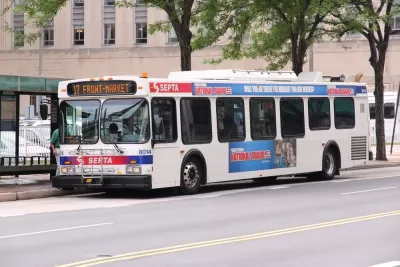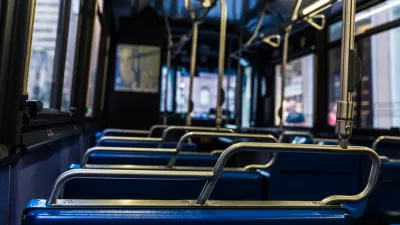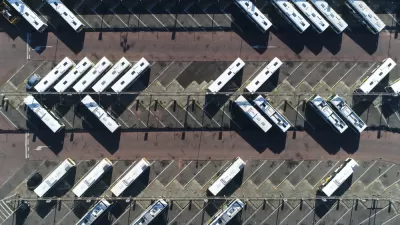As rainy day funds and federal aid dwindle, transit agencies formerly reliant on farebox revenue are exploring new ways to fund their operations.

Transit agencies in some of the biggest U.S. cities “are facing a fiscal cliff,” according to one in a series of Governing articles that outline the prospects of transit agencies around the country.
As Jake Blumgart writes, “It is worth noting that the vast majority of American transit systems do not rely on fares for much of their budget. Their ridership is overwhelmingly comprised of lower-income passengers, who have not had the luxury of remote work during the pandemic.” But for agencies in big cities where remote work made a big impact on ridership and revenue, the drastic change in how people use transit could mean an existential crisis.
The article describes an analysis by TransitCenter of transit systems in New York, Philadelphia, and Chicago. New York’s Metropolitan Transportation Authority (MTA) doesn’t face a budget shortfall until 2025, in part thanks to its “expansive” ability to borrow money. But to maintain the system long-term, the agency needs new sources of funding, such as the city’s congestion pricing program. Philadelphia’s Southeastern Pennsylvania Transportation Authority (SEPTA), meanwhile, is cushioned by a rainy day fund that the state requires transit agencies to maintain. In Chicago, the Regional Transportation Authority (RTA) is relying on the generous amount of federal aid it received, as well as a local sales tax on online sales that contributes to the agency’s revenue.
All three agencies, however, expect to face budget shortfalls by the end of 2025.
FULL STORY: For Mass Transit Agencies, a Fiscal Cliff Looms (Part II)

Maui's Vacation Rental Debate Turns Ugly
Verbal attacks, misinformation campaigns and fistfights plague a high-stakes debate to convert thousands of vacation rentals into long-term housing.

Planetizen Federal Action Tracker
A weekly monitor of how Trump’s orders and actions are impacting planners and planning in America.

In Urban Planning, AI Prompting Could be the New Design Thinking
Creativity has long been key to great urban design. What if we see AI as our new creative partner?

King County Supportive Housing Program Offers Hope for Unhoused Residents
The county is taking a ‘Housing First’ approach that prioritizes getting people into housing, then offering wraparound supportive services.

Researchers Use AI to Get Clearer Picture of US Housing
Analysts are using artificial intelligence to supercharge their research by allowing them to comb through data faster. Though these AI tools can be error prone, they save time and housing researchers are optimistic about the future.

Making Shared Micromobility More Inclusive
Cities and shared mobility system operators can do more to include people with disabilities in planning and operations, per a new report.
Urban Design for Planners 1: Software Tools
This six-course series explores essential urban design concepts using open source software and equips planners with the tools they need to participate fully in the urban design process.
Planning for Universal Design
Learn the tools for implementing Universal Design in planning regulations.
planning NEXT
Appalachian Highlands Housing Partners
Mpact (founded as Rail~Volution)
City of Camden Redevelopment Agency
City of Astoria
City of Portland
City of Laramie





























